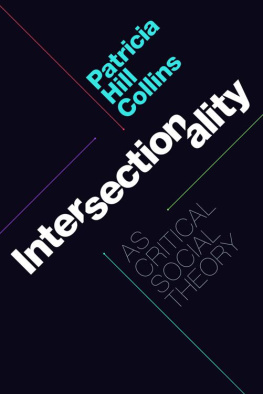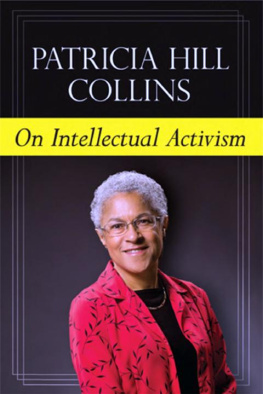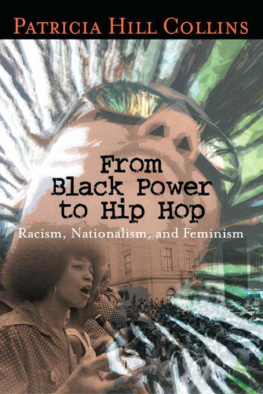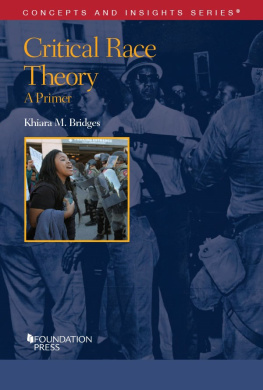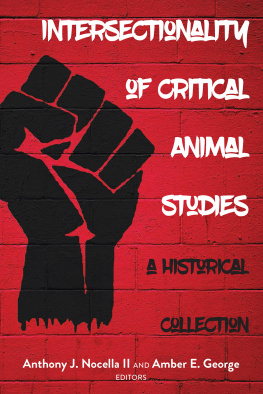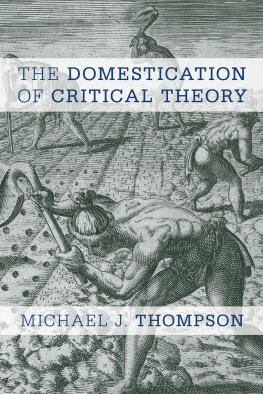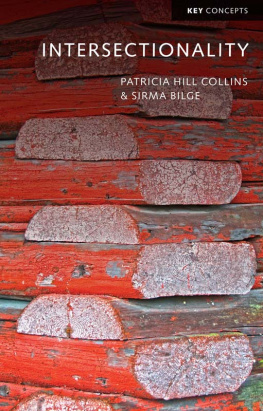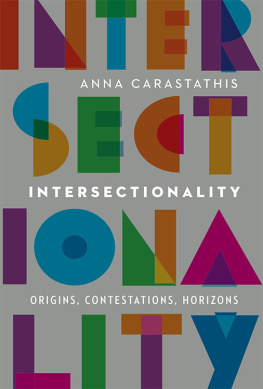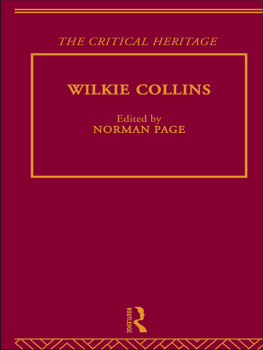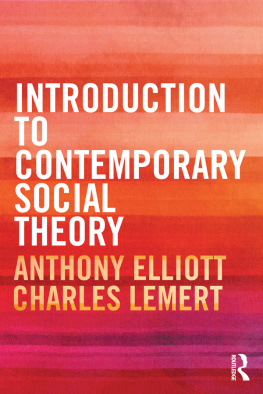Patricia Hill Collins - Intersectionality as Critical Social Theory
Here you can read online Patricia Hill Collins - Intersectionality as Critical Social Theory full text of the book (entire story) in english for free. Download pdf and epub, get meaning, cover and reviews about this ebook. year: 2019, publisher: Duke University Press, genre: Politics. Description of the work, (preface) as well as reviews are available. Best literature library LitArk.com created for fans of good reading and offers a wide selection of genres:
Romance novel
Science fiction
Adventure
Detective
Science
History
Home and family
Prose
Art
Politics
Computer
Non-fiction
Religion
Business
Children
Humor
Choose a favorite category and find really read worthwhile books. Enjoy immersion in the world of imagination, feel the emotions of the characters or learn something new for yourself, make an fascinating discovery.
- Book:Intersectionality as Critical Social Theory
- Author:
- Publisher:Duke University Press
- Genre:
- Year:2019
- Rating:3 / 5
- Favourites:Add to favourites
- Your mark:
- 60
- 1
- 2
- 3
- 4
- 5
Intersectionality as Critical Social Theory: summary, description and annotation
We offer to read an annotation, description, summary or preface (depends on what the author of the book "Intersectionality as Critical Social Theory" wrote himself). If you haven't found the necessary information about the book — write in the comments, we will try to find it.
Intersectionality as Critical Social Theory — read online for free the complete book (whole text) full work
Below is the text of the book, divided by pages. System saving the place of the last page read, allows you to conveniently read the book "Intersectionality as Critical Social Theory" online for free, without having to search again every time where you left off. Put a bookmark, and you can go to the page where you finished reading at any time.
Font size:
Interval:
Bookmark:
as Critical Social Theory
________
PATRICIAHILLCOLLINS
DUKE UNIVERSITY PRESSDurham and London 2019
2019 DUKE UNIVERSITY PRESS
All rights reserved
Printed in the United States of America on acid-free paper
Designed by Matthew Tauch
Typeset in Minion Pro and Helvetica Neue Lt Std by Westchester Publishing Services Library of Congress Cataloging-in-Publication Data Names: Hill Collins, Patricia, author.
Title: Intersectionality as critical social theory / Patricia Hill Collins.
Description: Durham : Duke University Press, 2019. | Includes bibliographical references and index.
Identifiers: LCCN 2018061091 (print) | LCCN 2019005395 (ebook) ISBN 9781478007098 (ebook) ISBN 9781478005421 (hardcover : alk. paper) ISBN 9781478006466 (pbk. : alk. paper) Subjects: LCSH: Intersectionality (Sociology) | Critical theory. | Social change. | Social justice.
Classification: LCC HM488.5 (ebook) | LCC HM488.5 .H56 2019 (print) | DDC 303.4dc23
LC record available at https://lccn.loc.gov/2018061091
This book is dedicated to the memory of my parents,
Eunice Randolph Hill and Albert Hill
My time in the sociology department at the University of Maryland, College Park, was essential to my ability to write this book. I thank my colleagues George Ritzer and Laura Mamo, who welcomed me into our theory graduate specialization. Over the years, conversations with my faculty colleagues within sociology greatly enriched my thinking this project, among them Bill Falk, Feinian Chen, Harriett Presser, Stanley Presser, Sonalde Desai, Meyer Kestnbaum, Kris Marsh, Jeff Lucas, Rashawn Ray, and Dawn Dow. Special appreciation goes to Roberto Patricio Korzeniewicz, not only for his support of my scholarship but also for his fundamental fairness and humanity in relation to the issues in this book. What a gift that he was department chair as I finished this manuscript.
Because I worked on various aspects of this book during my entire tenure at the University of Maryland, I could not have completed various stages of this project without help from a mini-army of graduate students. My teaching and my service on dissertation committees in sociology, American studies, education, kinesiology, journalism, and womens studies greatly enriched the knowledge that I brought to this project. This intensive work with students as well as the contact I had with wonderful graduate and undergraduate students through my teaching and casual hallway conversations enriched this project. Now that the pain is behind all of us, I want to acknowledge the students whose dissertations in sociology I chaired or co-chaired: Tony Hatch, Michelle Corbin, Nazneen Kane, Paul Dean, Valerie Chepp, Margaret Austin Smith, Kendra Barber, Kathryn Buford, Mi chelle Beadle, Danny Swann, Rachel Guo, and Sojin Yu. I also acknowledge students whose dissertations inform important aspects of this book. Thank you to Emily Mann, Daniel Williams, Michelle Smirnova, Nihal Celik, Jillet Sam, Chang Won Lee, Aleia Clark, Les Andrist, Wendy Laybourn, Thurman Bridges, Christine Muller, Amy Washburn, Benli Shecter, Rod Carey, Laura Yee, Aaron Allen, Dina Shafey, Kristi Tredway, Allissa Richardson, and Kevin Winstead. I also thank students who are not mentioned above but who, through their service as research or teaching assistants or through unforgettable conversations, contributed to this project. Special thanks to Nicole de Loatsch, Zeynep Atalay, Carolina Martin, Beverly Pratt, Shanna Brewton-Tiayon, Melissa Brown, Anya Galli, Bill Yagatich, Dave Stroehecker, Kimberly Bonner, Bryan Clift, Joe Waggle, Heather Marsh, and the unforgettable Mehmet Ergun. I list you all because, while I could see the breadth and scope of the creativity that you brought to me, you often remained unaware of each other.
Over the years, my conversations with colleagues old and new have enriched my sense of intersectionalitys current practices and future possibilities. I cannot name you all, but I am thankful nonetheless. Special thanks to Margaret Andersen, Sirma Bilge, Nira Yuval-Davis, Bonnie Thornton Dill, Kanisha Bond, Brittney Cooper, Ana Claudia Perreira, Djamila Ribeiro, Kristi Dotson, Evelyn Nakano Glenn, Angela Y. Davis, Angela Randolpho Paiva, ngela Figueiredo, Laura Trout, Marcus Hunter, Colin Koopman, Waverly Duck, Kathryn T. Gines, Theresa Perry, Shawn Copeland, Juan Battle, Troy Duster, Erin Tarver, Beverly Guy-Sheftall, Elizabeth Higginbotham, Howard Winant, Kimberl Crenshaw, Linda Tuhiwai Smith, Graham Hingangaroa Smith, Jessie Daniels, Catherine Knight Steele, and Emek Ergun.
I would like to thank all of the people who invited me to visit your campuses, conferences, and community settings. I work out my ideas via conversation, and the public forums you provided were invaluable to this project. I have far too many people to be able to mention you individually, but I hope you know how appreciative I am for the opportunity to contribute to your initiatives.
The team of people at Duke University Press who worked with me on this book showed professionalism and exceptional patience. This book would not have been possible without the careful and caring stewardship of Gisela Concepcin Fosado, my editor. Our first conversation convinced me how much Gisela believed in this book, and her commitment to it was an important touchstone for me throughout its production. I thank the two anony mous reviewers who waded through an earlier, more convoluted version of this manuscript. I dont know how they did it, but they saw the promise of the argument and encouraged me to persist. The production team on this project has been first rate: special thanks to Andrea Klingler, the intrepid copyeditor who waded through the manuscript; as well as to Jessica Ryan, managing editor; Sara Leone, project editor; and Alejandra Meja, editorial associate.
Finally, a full and balanced life is necessary to nurture the life of the mind and to provide support for a project of this magnitude. Thanks to my friends in tap, Zumba, and tai chi, past, present, and future, for reminding me of the need to move. My sister-friend Patrice L. Dickerson provided a good listening ear throughout this project. And as always, my familyRoger, Valerie, Lauren, Harrison, and Grantprovide much love and lots of laughter. They mean the world to me.
Intersectionality came of age in the twentieth century during a period of immense social change. Anticolonial struggles in Africa, Asia, and Latin America; the emergence of a global womens movement; civil rights movements in multicultural democracies; the end of the Cold War; and the defeat of apartheid in South Africa all signaled the end of long-standing forms of domination. It was clear that deeply entrenched social inequalities would not disappear overnight, nor would the social problems that they engendered. What was different was a new way of looking at social inequalities and possibilities for social change. Seeing the social problems caused by colonialism, racism, sexism, and nationalism as interconnected provided a new vantage on the possibilities for social change. Many people came to hope for something better, imagining new possibilities for their own lives and those of others.
Intersectionality draws from and carries this legacy. What were once diffuse ideas about the interconnectedness of people, social problems, and ideas are now central to intersectionality as a recognized form of critical inquiry and praxis. Yet, as intersectionality has matured, both it and the world around it have changed. Decolonization has morphed into neocolonialism, feminism confronts a deeply entrenched misogyny, civil rights flounders on the shoals of a color-blind racism, Cold War thinking persists in proxy form in undeclared wars, and racial apartheid has reformulated both within and across national borders. Social inequality seems as durable as ever. Within these new social conditions, new social problems complement long-standing ones from the past. Change seems to be everywhere, yet not in the way that intersectionalitys initial advocates imagined it would unfold. Democratic institutions that once offered such promise for realizing ideals of freedom, social justice, equality, and human rights are increasingly hollowed out from within by leaders who seem more committed to holding on to power than to serving the people. Such big ideals can seem less relevant nowquaint notions that were useful during past centuries but perhaps less attainable now. Given the scope and durability of social inequality and the social problems that it engenders, its hard not to become disillusioned. How do people engage in social action during times of such change such as our own? Conversely, which ideas will prove to be most useful in shaping such actions?
Font size:
Interval:
Bookmark:
Similar books «Intersectionality as Critical Social Theory»
Look at similar books to Intersectionality as Critical Social Theory. We have selected literature similar in name and meaning in the hope of providing readers with more options to find new, interesting, not yet read works.
Discussion, reviews of the book Intersectionality as Critical Social Theory and just readers' own opinions. Leave your comments, write what you think about the work, its meaning or the main characters. Specify what exactly you liked and what you didn't like, and why you think so.

